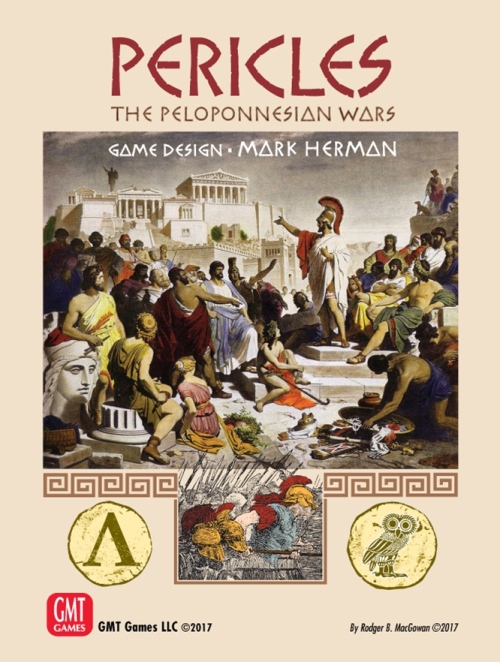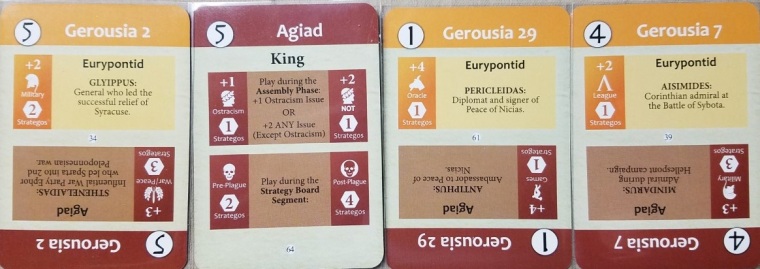Pericles feels big. Partially it owes this quality to its stark simulation of the Peleponnesian War, a brutal conflict that reshaped the ancient Greek world and lead to Sparta’s prominence. Per standard GMT disposition, this one completely embodies the political and historical strife emblazoned upon its cardboard exactitude. Surprising it is not to find a doe-eyed individual making their first trip to the public library in half a decade as consequence to plumb the oeuvre of Thucydides.
Pericles feels yet bigger due to the masterful execution of Mark Herman, legendary designer of conflict simulations. The scope of play feels as sweeping as its influence, capturing the multiple facets and subtleties of a very dynamic period in ancient history. The game shifts on a drachma between two distinct vectors, one mirroring the political turmoil of the affiliated leagues and another taking the seed planted in bureaucratic bloodletting to flower a spear yet thrust into the heart of those bastards at Attica.

Like the war it embodies, this is a game that teeters between butchery and reconciliation. It can be maddening as entirely as it can be captivating. At its best, it’s often skirting the line between each like a trireme cutting across the crest of a wave.
The most compelling feature of this work is the unique format. Pericles makes no apologies for its exact requirement of four players. It tells you to simply acquire more friends or gut the excess. Furthermore, the quad will be split into two teams, one taking on the alliance of Athens and the Delian League butting sword and helmet against the brazen legions of Sparta split by forces two of Eurypondit and Agaid.
Worth mentioning is that support for a head to head bout and even a solitaire experience exist, but neither feel as though they are Pericles as it’s meant to be.
The asymmetry here is distinct, with Athens sporting a navy that is dominant and Sparta wielding forces impenetrable in earthen combat. They each are fortified in opposing geography with battle-lines drawn uncomfortably close to each other’s holdings.
At once it’s easy to identify this as an evolution of Herman’s previous work, Churchill. It encapsulates the political brokering and gutter posturing of its fore-bearer while twisting the formula and radically changing the field. It adapts that initial spark of concept to the times and produces something entirely different. In short: it’s remarkable.

The political phase is fraught with internal animosity. Teammates alternate playing cards and managing their hands in order to prod and pull issues along a single axis. It’s a tug of war as one tries to tease diplomatic or military orders to their side of the amphitheater. There’s mutual interest not to leave these issues neutral, as the more cleanly decided topics between you and your teammate the more total orders your shared forces will execute.
That twisted conundrum of weighing team versus self is realized through the capricious victory point system. You need your particular side to overcome the other, but in the process you as an individual will need to achieve more honor than your partner. While most semi-cooperative designs tend to wobble, Pericles stands firm by executing sharply upon its concepts with measured incentives.
As you shift nervously in your seat, hoping to draw a few military orders so that you can triumphantly march towards the golden cities of yore, your opponents sit across conducting their own duplicitous affairs. This parallel struggle of inward resolution that is beaten and shaped before being turned outward upon your enemy is absolutely delightful. It stands in stark contrast to the more complicated and fussy campaigning in the Mediterranean that follows. This duel of wits is the very best Pericles has to offer.
Once each side’s isolated congress has resolved, order tokens are awarded. Players receives orders bestowed by the issues they’ve won. Participants then take turns placing these counters face-down upon the sprawling map and stacking them upon like locations. This mimics the unique mechanism found in StarCraft: The Board Game and later re-implemented in Forbidden Stars. It’s a brilliant last in/first out system that demands forward thought and rewards misdirection. It’s one of the many games-within-a-game this title hawks.

The political theater feeds smoothly into the war phase. It’s astounding how two distinct halves can feel so interconnected and coherent. Each order you place is an extension of those previous debates, an execution of your will as a lithe beast thrust upon your adversary. As you conquer city-state and amass honor your spectral machinations will take shape and satisfaction will be gleaned. It’s dizzying to behold.
There is a cost. By bridging two halves that are heavy as isolated entities, a whole that is ponderous emerges. This is an experience that is burdensome as a set of rules. It will take time to internalize and ever longer to master. Accessibility is immediately a concern and piercing the walls of this work will take quite the effort.
To alleviate some of the hardship, this title does offer a solid spread of scenarios, each targeted at specific game lengths while maintaining ties to historical situations. There’s a push for shorter bite-sized games to serve as an introduction, as well as lengthier 5+ hour marathons beckoning meal breaks and occasional pauses for stretching. The pocket of perfect length for complexity is right around three hours, with those shrinking or stretching the skin across the head of the drum resulting in rhythmic pitch that isn’t quite smooth. It’s unfortunate then that most players will have so little use for the bulk of scenario content.
Through a multitude of weighty rules, peak frustration arrives with movement. You cannot simply take a stack of troops and push them along a connection to an adjacent region. No, instead you must evaluate different colored arrows and their multitude of meanings. Some require you have naval accompaniment, others demand a stronghold or ownership of territory. It’s confusing, yet its purposely integrated as a function to model the geographic challenges of period logistics. At times it feels as though it’s not worth the trouble and this is the single element that causes the most frustration.

Combat is similarly complex with disruption and attrition calculated by chart. It appears obtuse, a trait that reverberates throughout and reflects the subject matter and concepts the game espouses. All of this nuance calls back to the earlier political phase and emphasizes those tightly wound jabs of oratory. For all its complexity and demands, Pericles certainly pays out in brilliance over the course of its epic.
The principal facet of this brilliance is in expression. One of Thucydides primary themes in transcribing the Peloponnesian Wars is the fleeting nature of political power and wartime success. This is similarly articulated by Mark Herman in the fragile duality of the political and war phases of Pericles. A nudge here, a shift there, and the entire peninsula is pushed to the brink. In but a moment, everything has collapsed and your breath is gone. Carefully orchestrated plans have crashed upon the shores of the Peloponnese and tomorrow has arrived before yesterday has begun.
This is a game I admire. However, it’s one I will not often play due to its rigor, length, and requirement of four. When it does hit the table it’s a singular experience that challenges and embraces. The result is a stupendous achievement that’s difficult to approach, but approach we must.
A review copy was provided by the publisher.
If you enjoy what I’m doing at Player Elimination and want to support my efforts, please consider dropping off a tip at my Ko-Fi.

I don’t play a lot of GMT games. They are a bit heavy and the components are a bit drab and dated looking for me.
The gameplay is excellent I’m sure and the components and art fit great for what they are doing – just not
my thing these days.
Excellent write up though!
P.S. – I’ll always remember GMT at one point had a deal where if you were out of work they would send you like 2 free games and I took advantage of that between jobs a long time ago. What a great company for doing something like that. I will always think kindly of them for giving back to the community when they didn’t have to.
LikeLike
For sure, I recall that offer they made for unemployed individuals and it definitely exemplifies what the company stands for.
I understand your concerns and agree somewhat (particularly with the components), but there are a few of these games that I really get into and enjoy as they provide something I can’t get elsewhere. Fire in the Lake is a great example as a title I will always love.
LikeLike
I really like Perciles – the game interestingly divided into two phases, with suspense of discovering who put which chit where. I also did my review (https://theboardgameschronicle.com/2018/06/27/review-pericles/) and some session reports (https://theboardgameschronicle.com/tag/pericles/) if you would be interested to have a look 🙂
LikeLike
Good work, great writeups!
LikeLiked by 1 person